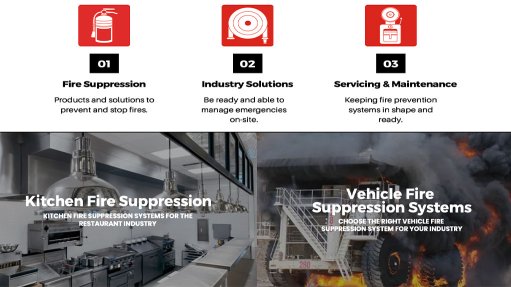Industrial gas users call for Presidency-led intervention to avert ‘gas cliff’
The Industrial Gas Users Association–South Africa (IGUA-SA) is calling for the creation of a new structure under The Presidency to coordinate the actions needed to avert the ‘gas cliff’ faced by industrial consumers by 2030 and to lay the foundations for longer-term security of supply and demand growth.
The proposal for the establishment of a National Gas Project Team, which would operate along lines similar to structures established to tackle the electricity and logistics crises, is included in a new ‘Gas Roadmap’ document released by IGUA-SA on November 12.
Executive officer Jaco Human says the document has been published in the absence of any practical plan to avert the gas supply crisis that will confront industrial users that collectively employ 75 000 people directly in the manufacturing, mining, petrochemicals, glass, steel, food, and paper sectors and contribute R700-billion yearly to the economy.
The supply crunch will begin when their supply from Mozambique is halted by Sasol in 2028 and Sasol’s more expensive methane-rich gas bridging solution is terminated two years later.
“This document outlines a viable path to prevent that outcome and achieve a sustainable gas future by 2042,” Human explains, adding that it is also designed to stimulate comment and as an urgent call to action.
The document includes ambitious proposals that extend well beyond addressing the immediate supply shortfall, outlining a corridor-based vision for increasing gas supply from 189 PJ currently to 1 076 PJ by 2042 to meet assumed demand growth across the industrial, petrochemical and electricity sectors.
The document highlights the additional gas demand that will be created by the electricity sector in line with the recently Gazetted Integrated Resource Plan 2025, but argues that there is still no clear supply and infrastructure pathway to meet that demand.
The document advocates for initial supply to be met from liquefied natural gas (LNG) import terminals in Maputo, Mozambique, followed by Richards Bay and Coega. However, it also envisages a later shift to lower-priced domestic gas produced off South Africa’s western and southern coasts.
“South Africa requires LNG from the East Coast to overcome the gas cliff, while developing West Coast gas and other domestic sources for a sustainable gas future,” Human states, arguing that the price of West Coast gas should be substantially cheaper, at between $6/GJ and $8/GJ, than LNG, which is assumed to be priced at between $10/GJ and $11/GJ.
However, the immediate focus of the National Gas Project Team would be on averting the gas cliff, with IGUA-SA outlining its creation as one point in a larger ten-point plan for tackling the crisis.
The other points include:
- Establishing political sponsorship within The Presidency to lead, oversee, coordinate, and drive the national gas cliff and transition agenda and ensure alignment across all relevant departments and entities;
- Creating a dedicated programme management office reporting to the National Gas Project Team to track milestones, manage infrastructure delivery, contracting, and fiscal support;
- Consolidating and sequencing gas demand across the electricity and industrial sectors, given that industrial demand alone cannot underwrite the LNG infrastructure;
- Defining and Publishing a ‘National Gas Infrastructure Roadmap’ to provide certainty for investors and synchronise infrastructure and demand timelines;
- Establishing a Fiscal Support and Guarantee Framework to facilitate public-private partnerships;
- Establishing bilateral and regional gas trade and infrastructure cooperation agreements with Mozambique and Namibia, and partnerships with LNG-exporting countries such as the US and Qatar;
- Identifying and empowering transactional aggregator vehicles to consolidate national industrial and power demand, coordinate procurement, and negotiate infrastructure access and supply agreements;
- Accelerating the publication of the Integrated Energy Plan and Gas Master Plan; and
- Aligning inter-departmental and State-owned enterprise mandates to ensure the timely integration of existing infrastructure, such as the Rompco and Lilly pipelines.
“The uncertainty of supply threatens South Africa’s industrial economy, with widespread job losses and economic contraction imminent.
“Urgent action is needed to prevent disruption and fast-track investment in alternative sources that can stabilise supply and support long-term growth,” Human avers.
Article Enquiry
Email Article
Save Article
Feedback
To advertise email advertising@creamermedia.co.za or click here
Press Office
Announcements
What's On
Subscribe to improve your user experience...
Option 1 (equivalent of R125 a month):
Receive a weekly copy of Creamer Media's Engineering News & Mining Weekly magazine
(print copy for those in South Africa and e-magazine for those outside of South Africa)
Receive daily email newsletters
Access to full search results
Access archive of magazine back copies
Access to Projects in Progress
Access to ONE Research Report of your choice in PDF format
Option 2 (equivalent of R375 a month):
All benefits from Option 1
PLUS
Access to Creamer Media's Research Channel Africa for ALL Research Reports, in PDF format, on various industrial and mining sectors
including Electricity; Water; Energy Transition; Hydrogen; Roads, Rail and Ports; Coal; Gold; Platinum; Battery Metals; etc.
Already a subscriber?
Forgotten your password?
Receive weekly copy of Creamer Media's Engineering News & Mining Weekly magazine (print copy for those in South Africa and e-magazine for those outside of South Africa)
➕
Recieve daily email newsletters
➕
Access to full search results
➕
Access archive of magazine back copies
➕
Access to Projects in Progress
➕
Access to ONE Research Report of your choice in PDF format
RESEARCH CHANNEL AFRICA
R4500 (equivalent of R375 a month)
SUBSCRIBEAll benefits from Option 1
➕
Access to Creamer Media's Research Channel Africa for ALL Research Reports on various industrial and mining sectors, in PDF format, including on:
Electricity
➕
Water
➕
Energy Transition
➕
Hydrogen
➕
Roads, Rail and Ports
➕
Coal
➕
Gold
➕
Platinum
➕
Battery Metals
➕
etc.
Receive all benefits from Option 1 or Option 2 delivered to numerous people at your company
➕
Multiple User names and Passwords for simultaneous log-ins
➕
Intranet integration access to all in your organisation





















